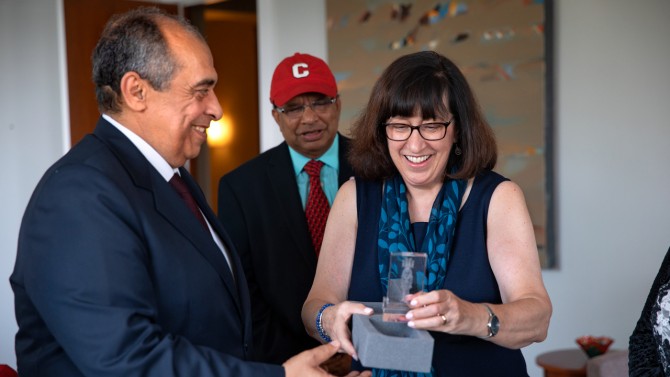A desert country straddling the fertile but fickle Nile River, Egypt fits squarely in the crosshairs of disruptive climate change. Decades of dynamic population growth and only modest gains in agricultural production have placed the country in a precarious position for the future.
Ezz El Din Abu Steit, Egyptian minister of agriculture and land reclamation, presents a ceremonial award to President Pollack as K.V. Raman, IP-CALS associate director, looks on.
"We are already facing challenges regarding water scarcity and population growth with limited natural resources," said Ezz El Din Abu Steit, Egypt's minister of agriculture and land reclamation. "We need to invest heavily in research activities in order to produce significant gains in all fields of agriculture. This is a critical period for Egypt; the consequences of what we do now will be felt for decades."
Abu Steit, along with Egypt's deputy minister of higher education and scientific research, and more than 30 academics and entrepreneurs gathered at Cornell in early August for talks about agricultural innovation. The first meeting of the steering committee for the Center of Excellence for Agriculture (COEA) in Egypt brought together experts to strategize ways to use agricultural resources to improve food quality and protect the environment.
"Cornell has a mission that extends far beyond our own students and faculty," said President Martha E. Pollack, who met with the minister and the deans of faculties of agriculture at Cairo University, Ain Shams University, Benha University and Assuit University. "This project is a great example of the kinds of collaboration that Cornell is capable of, where we're able to share and leverage our expertise in ways that will ultimately have a tremendous impact on people's lives."
Funded by the United States Agency for International Development-Egypt, the five-year collaborative project aims to train and equip the faculty and next generation of Egyptian students to improve agricultural production in the North African country.
Cornell experts in food science, business, plant breeding, information science and other disciplines met with counterparts from Cairo University to share knowledge and forge relationships. The visit - which included a trip to New York City to meet with Cornell Cooperative Extension experts and tour the Cornell Hydroponics, Aquaculture and Aquaponics Learning Labs at Food and Finance High School- accelerated efforts to learn from the U.S. model of integrated systems that combine education, research and private sector economic development.
Nearly 17% of land in the United States is suitable for growing crops; in Egypt, less than 3% of land is arable. For a country reliant on the Nile as the source of almost all of its water, the impact of climate change is already disrupting production and dramatically illustrating the need to adapt through scientific innovation.
"Cornell has vast experience in implementing agricultural innovations in the developing world," said K.V. Raman, project director and associate director of International Programs in the College of Agriculture and Life Sciences.
Raman said Cornell, as the main implementer, will support the development of a COEA in Cairo University's Faculty of Agriculture (COEA-CUFA) that leverages the strengths of Cairo University; four leading colleges of agriculture in the United States (Cornell, Purdue University, Michigan State University, the University of California, Davis); Sathguru Management Consultants; partner Egyptian universities; the Egyptian government; and agribusiness leaders.
The project will accelerate the exchange of experience and expertise in a bid to bring about education reforms. Entrepreneurship programs and student exchange between American and Egyptian universities is vital for building capacity and practical experience, said COEA chief of party Naglaa Abdallah.
She said the initiative will lead to joint research projects that will deepen relationships between American and Egyptian universities and build up for future scientific collaboration that will link the two countries.
Waleed Saleh, the project's technical coordinator of applied research, said he hopes the project leads to enhanced scientific research in support of the agricultural economy and related industries. He said all aspects of agriculture production and technological integration must be considered if Egypt is going to move ahead.
"In Egypt, we don't have a well-developed culture of technology transfer and implementation of research findings," he said. "Learning about the mechanisms of tech transfer and commercialization and putting applied research to use can put us in a place to innovate and compete."
Matt Hayes is associate director for communications in International Programs in the College of Agriculture and Life Sciences.







